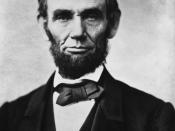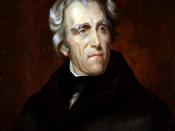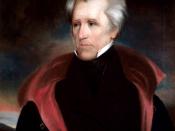In American history many acts of cruelty and or unjustified beliefs were acted upon. Some of these events were led by citizens and in some cases, such as the case of Andrew Jackson, led by presidents. Andrew Jackson was the seventh president of the United States of America from 1829-1837. His presidency and policies, such as the Indian Removal Act, his part in The Second National Bank of the U.S. and South Carolina's Tariff, will be remembered for years. They consisted of such personal opinion and were so controversial few will ever forget.
Jackson was a selfish, tyrannical ruler. He did not make decisions based on the interests of the whole nation but on his own personal benefit, in search of self-achievement. Although he was portrayed, or possibly manipulated the citizens to believe, that he was a president for the common man, this was simply not how he acted. As president, he purposely ignored the power of the judicial branch to judge laws, and strengthened the power of the executive branch above the limits in the Constitution.
He was also said to be rude and uneducated, which might have led to the reasons why he was such a power hungry tyrant.
The dislocation and disorders caused by the Industrial Revolution had a profound effect on the American politics. Andrew Jackson defined himself as the protector of farmers and workers. Liberty and Tyranny had come to mean two different things. The Jacksonian Democracy sought to advance liberty by removing the "special privileges" of the rich and the business class. Opposed to the Jacksonians were the Whigs, formed by Henry Clay and Daniel Webster, who believed that the federal government had a legitimate role in promoting economic growth. Andrew Jackson believed strongly that the people should govern themselves, but instead he took...


